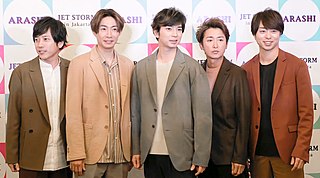J-pop, natively also known simply as pops, is the name for a form of popular music that entered the musical mainstream of Japan in the 1990s. Modern J-pop has its roots in traditional music of Japan, and significantly in 1960s pop and rock music. J-pop replaced kayōkyoku, a term for Japanese popular music from the 1920s to the 1980s in the Japanese music scene.

Arashi is a Japanese boy band consisting of five members formed under the Johnny & Associates talent agency. The members are Satoshi Ohno, Sho Sakurai, Masaki Aiba, Kazunari Ninomiya, and Jun Matsumoto. Arashi officially formed on September 15, 1999, in Honolulu, Hawaii, and made their debut CD on November 3, 1999. The group was initially signed to Pony Canyon and released one studio album and six singles—beginning with their 1999 eponymous debut single before moving to the Johnny's subsidiary label J Storm in 2001, which was initially set up for their succeeding releases. While their debut single sold close to a million copies, the group took a mixture of pop and alternate/contemporary approach to its music which attracted core followers, but subsequently faced commercially slow sales.

Crystal Kay Williams is a Japanese-American singer, songwriter, actress and radio host.
Ai Otsuka is a Japanese singer-songwriter from Suminoe-ku, Osaka, Japan. She is a popular artist on the Avex Trax label and is best known for her 2003 hit "Sakuranbo", which stayed in the Top 200 Oricon Weekly Singles Chart for 103 weeks.
KAT-TUN is a Japanese boy band formed under Smile-Up in 2001. The group's name was originally an acronym based on the first letter of each member's family name: Kazuya Kamenashi, Jin Akanishi, Junnosuke Taguchi, Koki Tanaka, Tatsuya Ueda, and Yuichi Nakamaru. Their debut on March 22, 2006, was marked by a tripartite release of a CD single, album and music DVD on their exclusive record label J-One Records. Since then, all of their single, album and music DVD releases have debuted at number one on the Oricon music and DVD charts.

Akina Nakamori is a Japanese singer and actress. She is one of the most popular and best-selling artists in Japan. Akina achieved national recognition after winning the 1981 season of the talent show Star Tanjō!. Her debut single "Slow Motion" was released to moderate success, peaking at number thirty on the Oricon Weekly Singles Chart. Nakamori's popularity increased with the release of her follow-up single, "Shōjo A", which peaked at number five on the Oricon charts and sold over 390,000 copies. Her second album Variation became her first number-one on the Oricon Weekly Albums Chart, staying in that position for three weeks.
Noriko Kamachi, known professionally as Seiko Matsuda, is a Japanese singer-songwriter, known for being one of the most popular Japanese idols of the 1980s. Since then, she is still actively releasing new singles and albums, doing annual summer concert tours, winter dinner shows, high-profile TV commercials and movies, and makes frequent TV appearances and radio broadcasts. Her alma matter is Chuo University.

Message is the second studio album by Japanese pop singer Aya Ueto. It was released on March 3, 2004 on Flight Master.

"Ai no Tame ni." is the seventh single by Japanese recording artist Aya Ueto. It was released on February 4, 2004 as the fourth and final single from Ueto's second studio album Message. The single was released in two formats: limited and standard editions, both issued with different covers.
Thelma Aoyama is a Japanese pop and R&B singer. She is part Afro-Trinidadian and Japanese.
"Everybody Goes " is the seventh single released by Mr. Children on December 12, 1994.

Flumpool are a Japanese rock band. The band, originally from Osaka Prefecture, was formed in January 2007. The band's name is a portmanteau of the words four, lump, and pool. Thus, the name could be interpreted to mean "collective mass of four" or a "quartet".

Touch Me! is the Japanese singer-songwriter Mai Kuraki's eighth studio album, which was released on January 21, 2009, in Japan by her record label Northern Music. The album was released in two formats; the regular single CD version and a limited CD+DVD version, whose content contained a behind the scenes look at the making of the album, as well as an interview and clips from her 2008 tour. The album follows the same pattern as "One Life", in which Kuraki collaborated with new composers.
Hideaki Tokunaga is a Japanese pop singer-songwriter and actor.

The Secret Code is the fourth Japanese studio album by South Korean pop group Tohoshinki, released on March 25, 2009 by Rhythm Zone. The album debuted at number two on the Oricon weekly chart. The Secret Code is Tohoshinki's last original studio album to feature members Jejung, Yuchun, and Junsu.
Fuyumi Sakamoto is a Japanese female enka singer under EMI Music Japan.

Kokoro no Hoshi is Becky♪♯'s debut album. It was released on February 24, 2010. For the months of March and April 2010, Becky was on tour to promote this album. The album comes as a "special price" edition; a standard edition with a special photo booklet; and a deluxe edition with the photo booklet, a mini-scrunchie designed by Becky, and a postcard to mail in for information on the live tour Becky is performing for the album. Her favorite songs off of the album are "Yami o Tsukinukete Yuku" and "Toki no Naka ni".

Koko ni Ita Koto is the debut studio album by the Japanese idol girl group AKB48. "Koko ni Ita Koto" was released in Japan on June 8, 2011, by King Records. There are three versions available: Limited Edition, Regular Edition (KIZC-117/8), and Theater Edition (NKCD-6546).

Koi ni Ochiru Toki is the first Japanese studio album by the South Korean boy band Infinite. It was released on June 5, 2013, in two different editions. The album is the first audio-related release of the group under Universal Music Japan's sublabel Universal D.
Zyyg is a Japanese rock band under B-Gram Records label. Their management office was Seas Music Factory. On April 1, 2019, it was announced their activities would resume after more than two decades.











